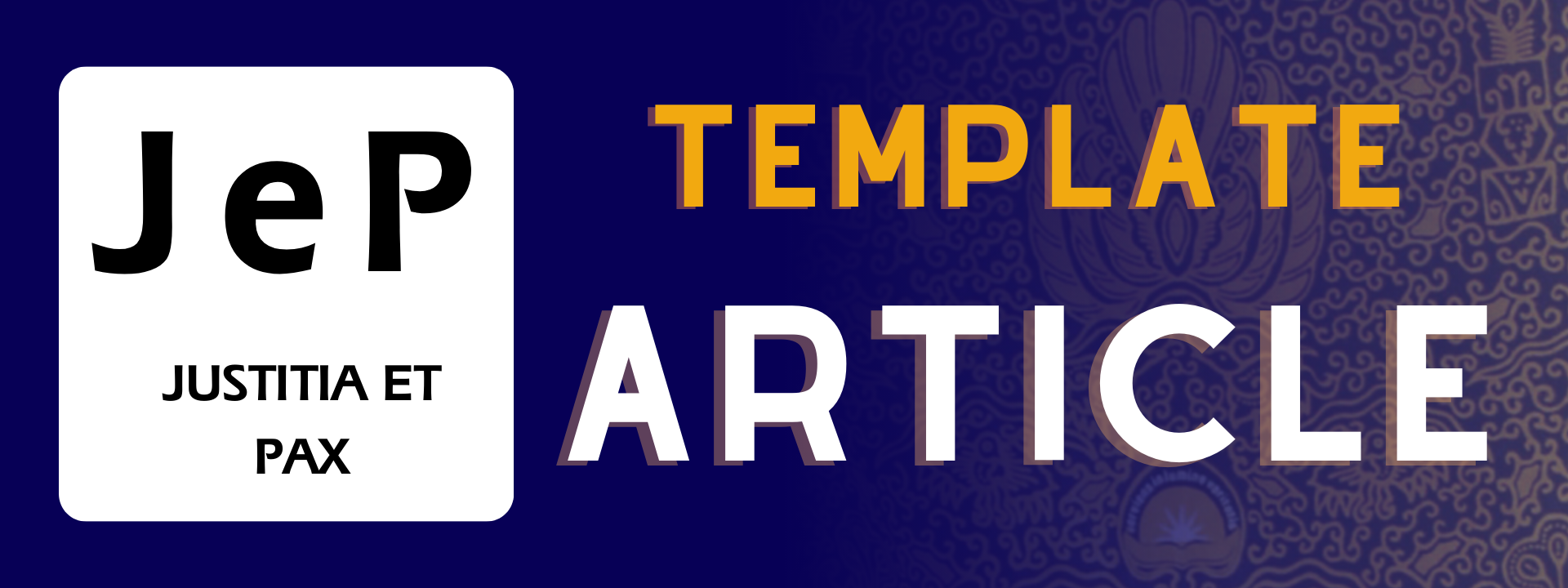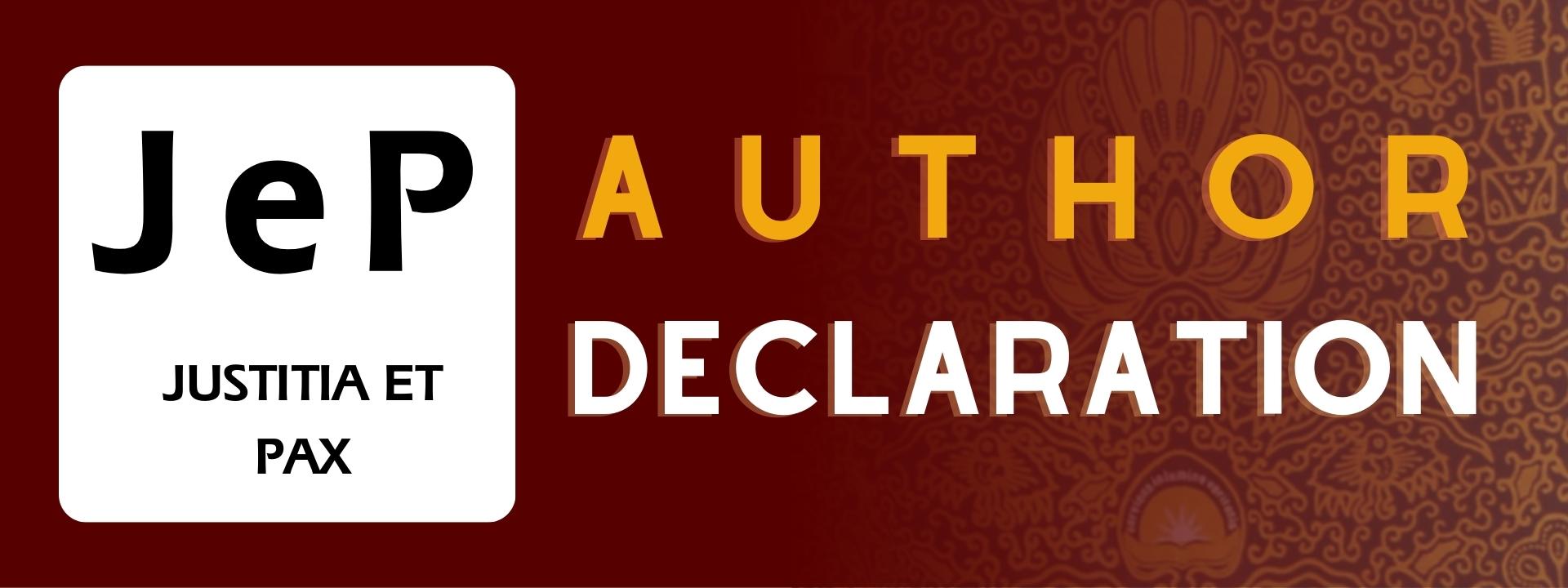PEMBAHARUAN PERATURAN DAERAH PASCA BERLAKU UNDANG-UNDANG DESA TAHUN 2014 DALAM MENJAGA EKSISTENSI NEGERI DI KABUPATEN MALUKU TENGAH
Indonesia
DOI:
https://doi.org/10.24002/jep.v40i2.8120Keywords:
Negeri Existence, Traditional Village, Update of Regional RegulationsAbstract
Law No. 6 of 2014 stipulates 2 (two) types of villages, namely villages and customary villages. Negeri is one form of customary village in Central Maluku Regency. Law No. 6 of 2014 requires the district/city government including the Central Maluku Regency government to determine customary villages. The determination of customary villages is carried out after the arrangement of customary law community units has been carried out. However, for almost 9 (nine) years since the enactment of Law No. 6 of 2014, the Central Maluku Regency Government has not taken any legal legitimizing action regarding the existence of negeri as a form of customary village. For this reason, the problem that will be studied in this writing is what are the legal implications for the existence of negeri after the enactment of Law No. 6 of 2014. The type of research chosen in studying the substance of this research is normative legal research, with the approach of Law No. 6 of 2014 and implementing regulations as the basis for the study in answering the renewal of Regional Regulations in maintaining the existence of Negeri in Central Maluku Regency. This study shows that the legal implications for the existence of the country after the enactment of Law No. 6 of 2014 are that the Central Maluku Regency Government must legitimize the existence of the country as a form of traditional village through the arrangement of customary law community units and designated as a country. The arrangement of customary law community units is carried out by the customary law community unit arrangement committee formed by the Regent. The identification results are determined by the Regent's decision as the basis for the formation of regional regulations on the determination of the country. In reality, the determination of customary law community units have not been carried out by the local government. This condition causes the existence of the country to have no legal legitimacy. In addition, the Central Maluku Regency Government must also update various regional regulations as the legal basis for the implementation of the country government in Central Maluku Regency.
References
Buku
Ali, H. Zainuddin, 2022, Metode Penelitian Hukum, Sinar Grafika, Jakarta.
Asshiddiqqie, Jimly, 2015, Gagasan Konstitusi Sosial. Institusionalisasi dan Konstitusionalisasi Kehidupan Sosial Masyarakat Madani, LP3ES, Jakarta.
Eko, Sutoro, 2014, Desa Membangun Indonesia, Forum Pengembangan Pembaharuan Desa, Yogyakarta.
Huda, Ni’matul, 2013, Otononomi Daerah, Cetakan Ketiga, Pustaka Pelajar, Yogyakarta.
______________, 2015, Hukum Pemerintahan Desa dalam Konstitusi Indonesia Sejak Kemerdekaan Hingga Era Reformasi, Setara Press, Malang.
Nurcholis, Chanif, 2017, Pemerintah Desa: Unit Pemerintahan Semu dalam Sistem Pemerintahan NKRI, Bee Media, Jakarta.
_______________, 2020, Pemerintah Desa Nagari Gampong Marga Dan Sejenisnya Pemrintahan Tidak Langsung Warisan Kolonial Yang Inkonstitusional, Universitas Terbuka, Tangerang Selatan.
Suteki, 2022, Metode Penelitian Hukum, Rajawali Pers, Depok.
Syafrudin, Ateng dan Suprin Na’a, 2010, Pergulatan Hukum Tradisional dan Hukum Modern Dalam Desain Otonomi Desa, Alumni, Bandung.
Yasin, Muhammad, et.al., 2015, Anotasi Undang-Undang Nomor 6 Tahun 2014 tentang Desa, Pusat Telaah dan Informasi Regional (PATTIRO), Jakarta.
Zakaria, R. Yando, 2013, Abih Tandeh: Masyarakat Desa di Bawah Rejim Orde Baru, ELSAM, Jakarta.
Jurnal
A., Hadi, “Desa Adat dalam Sistem Ketatanegaraan Republik Indonesia sebagai Implikasi Hukum setelah berlakunya UU No. 6 Tahun 2014 tentang Desa”, DiH Jurnal Ilmu Hukum, Vol. 13, No. 26, 2017.
Hirzan, Adli, “Tantangan Pemerintah Daerah dalam Penyusunan Peraturan Daerah Desa Adat: Upaya dalam Penetapan Desa Adat di Indragiri Hulu, Riau, Indonesian”, Journal of Religion and Society, Vol. 02, No. 01, 2020.
Lainsamputty, Natanel, “Nomenklatur Penataan Desa Adat Dalam Permendagri Nomor 1 Tahun 2017 tentang Penataan Desa”, Bacarita Law Journal, Vol. 3, No. 1, 2022.
Pattinasarany, Yohanes, “Peran Pemerintah Daerah Dalam Penetapan Batas-Batas Negeri”, Jurnal Sasi, Vol. 21, No. 2, 2015.
___________________, “Kepastian Hukum Kasasi Perkara Tata Usaha Negara Yang Dikeluarkan Oleh Pejabat Daerah”, Refleksi Hukum Jurnal Ilmu Hukum, Vol. 6, No. 2, 2022.
Prayogo, R. Tony, “Penerapan Asas Kepastian Hukum Dalam Peraturan Mahkamah Agung Nomor 1 Tahun 2011 tentang Hak Uji Materi dan Dalam Peraturan Mahkamah Konstitusi Nomor 06/PMK/2005 tentang Pedoman Beracara Dalam Pengujian Undang-Undang”, Jurnal Legislasi Indonesia, Vol. 13, No. 2, 2016.
Pribadiono, Agus, “Lembaga Desa Adat Dalam Pembangunan Desa Menurut UU No. 6 Tahun 2014: Antara Kemandirian Dan Subordinasi Pengaturan”, Lex Jurnalica, Vol. 13, No. 1, 2016.
Qurbani, Indah Dwi dan Muhammad Lukman Hakim, “Analisis Normatif Pengaturan Pembentukan Desa Adat”, Grondwet Jurnal Hukum Tata Negara dan Hukum Adminstrasi Negara, Vol. 1, No. 2, 2022.
Rauf, Muhammad A., “Politik Hukum Pembentukan Desa Adat Dalam Sistem Pemerintahan di Indonesia”, Jurnal De Lega Lata, Vol. 1, No. 2, 2016.
S., Noor, R., “Upaya Perlindungan Hukum Terhadap Eksistensi Masyarakat Hukum Adat di Kalimantan Tengah”, Morality: Jurnal Ilmu Hukum, Vol. 4, No. 2, 2018.
S., Warjiyati, “Eksistensi Hukum Adat Dalam Penyelesaian Konflik Pada Daerah Otonom”, Ahkam: Jurnal Hukum Islam, Vol. 6, No. 2, 2018.
Samsul, Inosentius, “Penguatan Lembaga Adat Sebagai Lembaga Alternatif Penyelesaian Sengketa”, Jurnal Negara Hukum, Vol. 5, No. 2, 2014.
Supriyadi, et.al., “Application of the Adat Principles Barenti ko Syara’, Syara’Barenti ko Kitabullah in Sumbawa Regency”, International Journal of Scientific Research and Management (IJSRM), Vol. 11, No. 04, 2023.
Wantu, Fence M, “Antinomi Dalam Penegakan Hukum Oleh Hakim”, Jurnal Berkala Mimbar Hukum, Vol. 19, No. 3, 2007.
Wijayanta, Tata, “Asas Kepastian Hukum, Keadilan, dan Kemanfaatan Dalam Kaitanya Dengan Putusan Kepalitan Pengadilan Niaga”, Jurnal Dinamika Hukum, Vol. 14, No. 2, 2014.
Zulkarnain, Iskandar dan Ridham Priskap, “Implikasi Kebijakan Pemerintah Atas Pengakuan Dan Perlindungan Terhadap Masyarakat Hukum Adat Dalam Pemanfaatan Sumber Daya Alam di Provinsi Jambi”, Datin Law Jurnal, Vol. 4, No. 1, 2023.
Hasil Penelitian
Taqwaddin, 2010, Penguasaan Atas Pengelolaan Hutan Adat Oleh Masyarakat Hukum Adat (Mukim) di Provinsi Aceh, Disertasi, Doktor Ilmu Hukum Universitas Sumatera Utara, Medan.
Downloads
Published
Issue
Section
License

This work is licensed under a Creative Commons Attribution-NonCommercial-ShareAlike 4.0 International License.
Authors who publish with this journal agree to the following terms:
- Authors retain copyright and grant the journal right of first publication with the work simultaneously licensed under a Creative Commons Attribution License that allows others to share the work with an acknowledgement of the work's authorship and initial publication in this journal.
- Authors are able to enter into separate, additional contractual arrangements for the non-exclusive distribution of the journal's published version of the work (e.g., post it to an institutional repository or publish it in a book), with an acknowledgement of its initial publication in this journal.
- Authors are permitted and encouraged to post their work online (e.g., in institutional repositories or on their website) prior to and during the submission process, as it can lead to productive exchanges, as well as earlier and greater citation of published work (See The Effect of Open Access).

This work is licensed under a Creative Commons Attribution-NonCommercial-ShareAlike 4.0 International License.




















